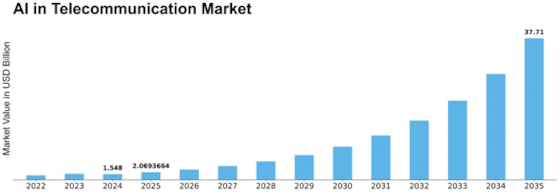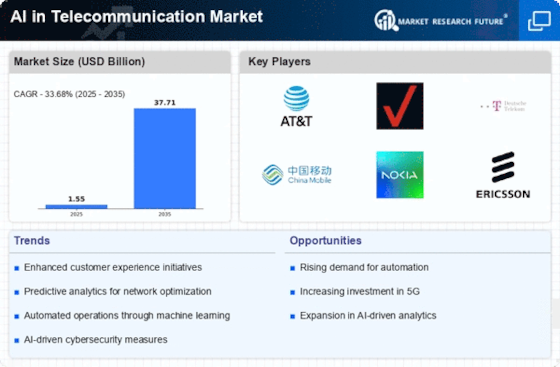Network Optimization
Predictive Maintenance
Customer Experience Management
Fraud Detection
Traffic Management
Machine Learning
Natural Language Processing
Computer Vision
Data Analytics
Cloud
On-Premises
Hybrid
Mobile Operators
Internet Service Providers
Enterprises
North America
Europe
South America
Asia Pacific
Middle East and Africa
North America Outlook (USD Billion, 2019-2035)
North America AI in Telecommunication Market by Application Type
Network Optimization
Predictive Maintenance
Customer Experience Management
Fraud Detection
Traffic Management
North America AI in Telecommunication Market by Technology Type
Machine Learning
Natural Language Processing
Computer Vision
Data Analytics
North America AI in Telecommunication Market by Deployment Mode Type
Cloud
On-Premises
Hybrid
North America AI in Telecommunication Market by End Use Type
Mobile Operators
Internet Service Providers
Enterprises
North America AI in Telecommunication Market by Regional Type
US
Canada
US Outlook (USD Billion, 2019-2035)
US AI in Telecommunication Market by Application Type
Network Optimization
Predictive Maintenance
Customer Experience Management
Fraud Detection
Traffic Management
US AI in Telecommunication Market by Technology Type
Machine Learning
Natural Language Processing
Computer Vision
Data Analytics
US AI in Telecommunication Market by Deployment Mode Type
Cloud
On-Premises
Hybrid
US AI in Telecommunication Market by End Use Type
Mobile Operators
Internet Service Providers
Enterprises
CANADA Outlook (USD Billion, 2019-2035)
CANADA AI in Telecommunication Market by Application Type
Network Optimization
Predictive Maintenance
Customer Experience Management
Fraud Detection
Traffic Management
CANADA AI in Telecommunication Market by Technology Type
Machine Learning
Natural Language Processing
Computer Vision
Data Analytics
CANADA AI in Telecommunication Market by Deployment Mode Type
Cloud
On-Premises
Hybrid
CANADA AI in Telecommunication Market by End Use Type
Mobile Operators
Internet Service Providers
Enterprises
Europe Outlook (USD Billion, 2019-2035)
Europe AI in Telecommunication Market by Application Type
Network Optimization
Predictive Maintenance
Customer Experience Management
Fraud Detection
Traffic Management
Europe AI in Telecommunication Market by Technology Type
Machine Learning
Natural Language Processing
Computer Vision
Data Analytics
Europe AI in Telecommunication Market by Deployment Mode Type
Cloud
On-Premises
Hybrid
Europe AI in Telecommunication Market by End Use Type
Mobile Operators
Internet Service Providers
Enterprises
Europe AI in Telecommunication Market by Regional Type
Germany
UK
France
Russia
Italy
Spain
Rest of Europe
GERMANY Outlook (USD Billion, 2019-2035)
GERMANY AI in Telecommunication Market by Application Type
Network Optimization
Predictive Maintenance
Customer Experience Management
Fraud Detection
Traffic Management
GERMANY AI in Telecommunication Market by Technology Type
Machine Learning
Natural Language Processing
Computer Vision
Data Analytics
GERMANY AI in Telecommunication Market by Deployment Mode Type
Cloud
On-Premises
Hybrid
GERMANY AI in Telecommunication Market by End Use Type
Mobile Operators
Internet Service Providers
Enterprises
UK Outlook (USD Billion, 2019-2035)
UK AI in Telecommunication Market by Application Type
Network Optimization
Predictive Maintenance
Customer Experience Management
Fraud Detection
Traffic Management
UK AI in Telecommunication Market by Technology Type
Machine Learning
Natural Language Processing
Computer Vision
Data Analytics
UK AI in Telecommunication Market by Deployment Mode Type
Cloud
On-Premises
Hybrid
UK AI in Telecommunication Market by End Use Type
Mobile Operators
Internet Service Providers
Enterprises
FRANCE Outlook (USD Billion, 2019-2035)
FRANCE AI in Telecommunication Market by Application Type
Network Optimization
Predictive Maintenance
Customer Experience Management
Fraud Detection
Traffic Management
FRANCE AI in Telecommunication Market by Technology Type
Machine Learning
Natural Language Processing
Computer Vision
Data Analytics
FRANCE AI in Telecommunication Market by Deployment Mode Type
Cloud
On-Premises
Hybrid
FRANCE AI in Telecommunication Market by End Use Type
Mobile Operators
Internet Service Providers
Enterprises
RUSSIA Outlook (USD Billion, 2019-2035)
RUSSIA AI in Telecommunication Market by Application Type
Network Optimization
Predictive Maintenance
Customer Experience Management
Fraud Detection
Traffic Management
RUSSIA AI in Telecommunication Market by Technology Type
Machine Learning
Natural Language Processing
Computer Vision
Data Analytics
RUSSIA AI in Telecommunication Market by Deployment Mode Type
Cloud
On-Premises
Hybrid
RUSSIA AI in Telecommunication Market by End Use Type
Mobile Operators
Internet Service Providers
Enterprises
ITALY Outlook (USD Billion, 2019-2035)
ITALY AI in Telecommunication Market by Application Type
Network Optimization
Predictive Maintenance
Customer Experience Management
Fraud Detection
Traffic Management
ITALY AI in Telecommunication Market by Technology Type
Machine Learning
Natural Language Processing
Computer Vision
Data Analytics
ITALY AI in Telecommunication Market by Deployment Mode Type
Cloud
On-Premises
Hybrid
ITALY AI in Telecommunication Market by End Use Type
Mobile Operators
Internet Service Providers
Enterprises
SPAIN Outlook (USD Billion, 2019-2035)
SPAIN AI in Telecommunication Market by Application Type
Network Optimization
Predictive Maintenance
Customer Experience Management
Fraud Detection
Traffic Management
SPAIN AI in Telecommunication Market by Technology Type
Machine Learning
Natural Language Processing
Computer Vision
Data Analytics
SPAIN AI in Telecommunication Market by Deployment Mode Type
Cloud
On-Premises
Hybrid
SPAIN AI in Telecommunication Market by End Use Type
Mobile Operators
Internet Service Providers
Enterprises
REST OF EUROPE Outlook (USD Billion, 2019-2035)
REST OF EUROPE AI in Telecommunication Market by Application Type
Network Optimization
Predictive Maintenance
Customer Experience Management
Fraud Detection
Traffic Management
REST OF EUROPE AI in Telecommunication Market by Technology Type
Machine Learning
Natural Language Processing
Computer Vision
Data Analytics
REST OF EUROPE AI in Telecommunication Market by Deployment Mode Type
Cloud
On-Premises
Hybrid
REST OF EUROPE AI in Telecommunication Market by End Use Type
Mobile Operators
Internet Service Providers
Enterprises
APAC Outlook (USD Billion, 2019-2035)
APAC AI in Telecommunication Market by Application Type
Network Optimization
Predictive Maintenance
Customer Experience Management
Fraud Detection
Traffic Management
APAC AI in Telecommunication Market by Technology Type
Machine Learning
Natural Language Processing
Computer Vision
Data Analytics
APAC AI in Telecommunication Market by Deployment Mode Type
Cloud
On-Premises
Hybrid
APAC AI in Telecommunication Market by End Use Type
Mobile Operators
Internet Service Providers
Enterprises
APAC AI in Telecommunication Market by Regional Type
China
India
Japan
South Korea
Malaysia
Thailand
Indonesia
Rest of APAC
CHINA Outlook (USD Billion, 2019-2035)
CHINA AI in Telecommunication Market by Application Type
Network Optimization
Predictive Maintenance
Customer Experience Management
Fraud Detection
Traffic Management
CHINA AI in Telecommunication Market by Technology Type
Machine Learning
Natural Language Processing
Computer Vision
Data Analytics
CHINA AI in Telecommunication Market by Deployment Mode Type
Cloud
On-Premises
Hybrid
CHINA AI in Telecommunication Market by End Use Type
Mobile Operators
Internet Service Providers
Enterprises
INDIA Outlook (USD Billion, 2019-2035)
INDIA AI in Telecommunication Market by Application Type
Network Optimization
Predictive Maintenance
Customer Experience Management
Fraud Detection
Traffic Management
INDIA AI in Telecommunication Market by Technology Type
Machine Learning
Natural Language Processing
Computer Vision
Data Analytics
INDIA AI in Telecommunication Market by Deployment Mode Type
Cloud
On-Premises
Hybrid
INDIA AI in Telecommunication Market by End Use Type
Mobile Operators
Internet Service Providers
Enterprises
JAPAN Outlook (USD Billion, 2019-2035)
JAPAN AI in Telecommunication Market by Application Type
Network Optimization
Predictive Maintenance
Customer Experience Management
Fraud Detection
Traffic Management
JAPAN AI in Telecommunication Market by Technology Type
Machine Learning
Natural Language Processing
Computer Vision
Data Analytics
JAPAN AI in Telecommunication Market by Deployment Mode Type
Cloud
On-Premises
Hybrid
JAPAN AI in Telecommunication Market by End Use Type
Mobile Operators
Internet Service Providers
Enterprises
SOUTH KOREA Outlook (USD Billion, 2019-2035)
SOUTH KOREA AI in Telecommunication Market by Application Type
Network Optimization
Predictive Maintenance
Customer Experience Management
Fraud Detection
Traffic Management
SOUTH KOREA AI in Telecommunication Market by Technology Type
Machine Learning
Natural Language Processing
Computer Vision
Data Analytics
SOUTH KOREA AI in Telecommunication Market by Deployment Mode Type
Cloud
On-Premises
Hybrid
SOUTH KOREA AI in Telecommunication Market by End Use Type
Mobile Operators
Internet Service Providers
Enterprises
MALAYSIA Outlook (USD Billion, 2019-2035)
MALAYSIA AI in Telecommunication Market by Application Type
Network Optimization
Predictive Maintenance
Customer Experience Management
Fraud Detection
Traffic Management
MALAYSIA AI in Telecommunication Market by Technology Type
Machine Learning
Natural Language Processing
Computer Vision
Data Analytics
MALAYSIA AI in Telecommunication Market by Deployment Mode Type
Cloud
On-Premises
Hybrid
MALAYSIA AI in Telecommunication Market by End Use Type
Mobile Operators
Internet Service Providers
Enterprises
THAILAND Outlook (USD Billion, 2019-2035)
THAILAND AI in Telecommunication Market by Application Type
Network Optimization
Predictive Maintenance
Customer Experience Management
Fraud Detection
Traffic Management
THAILAND AI in Telecommunication Market by Technology Type
Machine Learning
Natural Language Processing
Computer Vision
Data Analytics
THAILAND AI in Telecommunication Market by Deployment Mode Type
Cloud
On-Premises
Hybrid
THAILAND AI in Telecommunication Market by End Use Type
Mobile Operators
Internet Service Providers
Enterprises
INDONESIA Outlook (USD Billion, 2019-2035)
INDONESIA AI in Telecommunication Market by Application Type
Network Optimization
Predictive Maintenance
Customer Experience Management
Fraud Detection
Traffic Management
INDONESIA AI in Telecommunication Market by Technology Type
Machine Learning
Natural Language Processing
Computer Vision
Data Analytics
INDONESIA AI in Telecommunication Market by Deployment Mode Type
Cloud
On-Premises
Hybrid
INDONESIA AI in Telecommunication Market by End Use Type
Mobile Operators
Internet Service Providers
Enterprises
REST OF APAC Outlook (USD Billion, 2019-2035)
REST OF APAC AI in Telecommunication Market by Application Type
Network Optimization
Predictive Maintenance
Customer Experience Management
Fraud Detection
Traffic Management
REST OF APAC AI in Telecommunication Market by Technology Type
Machine Learning
Natural Language Processing
Computer Vision
Data Analytics
REST OF APAC AI in Telecommunication Market by Deployment Mode Type
Cloud
On-Premises
Hybrid
REST OF APAC AI in Telecommunication Market by End Use Type
Mobile Operators
Internet Service Providers
Enterprises
South America Outlook (USD Billion, 2019-2035)
South America AI in Telecommunication Market by Application Type
Network Optimization
Predictive Maintenance
Customer Experience Management
Fraud Detection
Traffic Management
South America AI in Telecommunication Market by Technology Type
Machine Learning
Natural Language Processing
Computer Vision
Data Analytics
South America AI in Telecommunication Market by Deployment Mode Type
Cloud
On-Premises
Hybrid
South America AI in Telecommunication Market by End Use Type
Mobile Operators
Internet Service Providers
Enterprises
South America AI in Telecommunication Market by Regional Type
Brazil
Mexico
Argentina
Rest of South America
BRAZIL Outlook (USD Billion, 2019-2035)
BRAZIL AI in Telecommunication Market by Application Type
Network Optimization
Predictive Maintenance
Customer Experience Management
Fraud Detection
Traffic Management
BRAZIL AI in Telecommunication Market by Technology Type
Machine Learning
Natural Language Processing
Computer Vision
Data Analytics
BRAZIL AI in Telecommunication Market by Deployment Mode Type
Cloud
On-Premises
Hybrid
BRAZIL AI in Telecommunication Market by End Use Type
Mobile Operators
Internet Service Providers
Enterprises
MEXICO Outlook (USD Billion, 2019-2035)
MEXICO AI in Telecommunication Market by Application Type
Network Optimization
Predictive Maintenance
Customer Experience Management
Fraud Detection
Traffic Management
MEXICO AI in Telecommunication Market by Technology Type
Machine Learning
Natural Language Processing
Computer Vision
Data Analytics
MEXICO AI in Telecommunication Market by Deployment Mode Type
Cloud
On-Premises
Hybrid
MEXICO AI in Telecommunication Market by End Use Type
Mobile Operators
Internet Service Providers
Enterprises
ARGENTINA Outlook (USD Billion, 2019-2035)
ARGENTINA AI in Telecommunication Market by Application Type
Network Optimization
Predictive Maintenance
Customer Experience Management
Fraud Detection
Traffic Management
ARGENTINA AI in Telecommunication Market by Technology Type
Machine Learning
Natural Language Processing
Computer Vision
Data Analytics
ARGENTINA AI in Telecommunication Market by Deployment Mode Type
Cloud
On-Premises
Hybrid
ARGENTINA AI in Telecommunication Market by End Use Type
Mobile Operators
Internet Service Providers
Enterprises
REST OF SOUTH AMERICA Outlook (USD Billion, 2019-2035)
REST OF SOUTH AMERICA AI in Telecommunication Market by Application Type
Network Optimization
Predictive Maintenance
Customer Experience Management
Fraud Detection
Traffic Management
REST OF SOUTH AMERICA AI in Telecommunication Market by Technology Type
Machine Learning
Natural Language Processing
Computer Vision
Data Analytics
REST OF SOUTH AMERICA AI in Telecommunication Market by Deployment Mode Type
Cloud
On-Premises
Hybrid
REST OF SOUTH AMERICA AI in Telecommunication Market by End Use Type
Mobile Operators
Internet Service Providers
Enterprises
MEA Outlook (USD Billion, 2019-2035)
MEA AI in Telecommunication Market by Application Type
Network Optimization
Predictive Maintenance
Customer Experience Management
Fraud Detection
Traffic Management
MEA AI in Telecommunication Market by Technology Type
Machine Learning
Natural Language Processing
Computer Vision
Data Analytics
MEA AI in Telecommunication Market by Deployment Mode Type
Cloud
On-Premises
Hybrid
MEA AI in Telecommunication Market by End Use Type
Mobile Operators
Internet Service Providers
Enterprises
MEA AI in Telecommunication Market by Regional Type
GCC Countries
South Africa
Rest of MEA
GCC COUNTRIES Outlook (USD Billion, 2019-2035)
GCC COUNTRIES AI in Telecommunication Market by Application Type
Network Optimization
Predictive Maintenance
Customer Experience Management
Fraud Detection
Traffic Management
GCC COUNTRIES AI in Telecommunication Market by Technology Type
Machine Learning
Natural Language Processing
Computer Vision
Data Analytics
GCC COUNTRIES AI in Telecommunication Market by Deployment Mode Type
Cloud
On-Premises
Hybrid
GCC COUNTRIES AI in Telecommunication Market by End Use Type
Mobile Operators
Internet Service Providers
Enterprises
SOUTH AFRICA Outlook (USD Billion, 2019-2035)
SOUTH AFRICA AI in Telecommunication Market by Application Type
Network Optimization
Predictive Maintenance
Customer Experience Management
Fraud Detection
Traffic Management
SOUTH AFRICA AI in Telecommunication Market by Technology Type
Machine Learning
Natural Language Processing
Computer Vision
Data Analytics
SOUTH AFRICA AI in Telecommunication Market by Deployment Mode Type
Cloud
On-Premises
Hybrid
SOUTH AFRICA AI in Telecommunication Market by End Use Type
Mobile Operators
Internet Service Providers
Enterprises
REST OF MEA Outlook (USD Billion, 2019-2035)
REST OF MEA AI in Telecommunication Market by Application Type
Network Optimization
Predictive Maintenance
Customer Experience Management
Fraud Detection
Traffic Management
REST OF MEA AI in Telecommunication Market by Technology Type
Machine Learning
Natural Language Processing
Computer Vision
Data Analytics
REST OF MEA AI in Telecommunication Market by Deployment Mode Type
Cloud
On-Premises
Hybrid
REST OF MEA AI in Telecommunication Market by End Use Type
Mobile Operators
Internet Service Providers
Enterprises



















Leave a Comment